几个世纪以来,世界的数次全球化浪潮皆因海而起。
西方海洋国家通过殖民扩张迅速发展起来,但内陆国家却长期被剥削、被掠夺,一直深陷贫穷的恶性循环。
For centuries globalization was largely shaped by sea. While Western maritime nations rapidly developed through colonial expansion, landlocked nations were trapped in a cycle of exploitation and poverty.
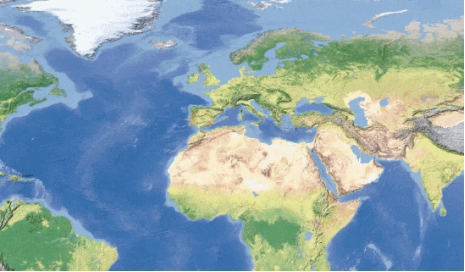
而一个新的全球化倡议正努力打破这一局面,重振内陆腹地国家的经济发展。
这就是中国的“一带一路”倡议(the Belt and Road Initiative)。
Over the past decade, a transformative initiative has begun to break this cycle and is revitalizing the economies of inland countries. That is the Belt and Road Initiative, established in 2013.
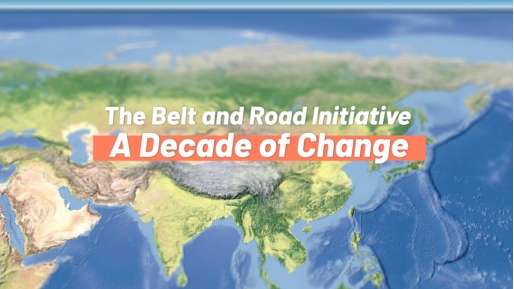
自2013年首次提出以来,“一带一路”征途已逾十年,它到底怎样改变了世界?
亚欧大陆连起来了
地图上最为直观的,是亚欧大陆间已建起了数条北、中、南向的铁路线,即中欧班列(China-Europe Railway Express)。
其中,北通道主要经中国内蒙古二连浩特、满洲里等铁路口岸连通蒙古、俄罗斯、白俄罗斯,通过波兰通达欧洲其他各国。

中通道主要经新疆阿拉山口、霍尔果斯铁路口岸连通哈萨克斯坦,在莫斯科与北通道会合。
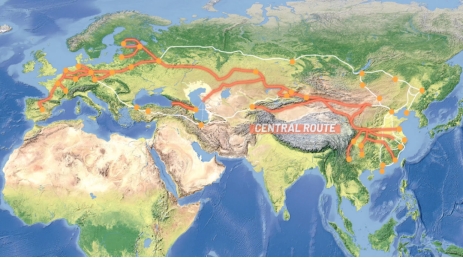
南通道从新疆出境,连通吉尔吉斯斯坦、伊朗、土耳其,再跨过黑海海峡到欧洲。
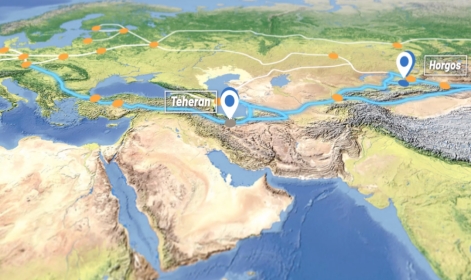
洲际铁路的开通,带来的直接好处就是降低了贸易成本。原本需要海运,甚至空运的货物,如今可以通过铁路快速运输,在时间快和成本低上取得了最佳平衡,直接促进了国际贸易的发展。
世界银行的研究表明,“一带一路”建设将使全球贸易成本降低1.8%。
These intercontinental railways have greatly reduced trade costs by providing a swift and cost-effective alternative to sea or air freight, thereby driving the growth of global trade.
According to the World Bank, the Belt and Road Initiative could reduce global trade costs by as much as 1.8 percent.
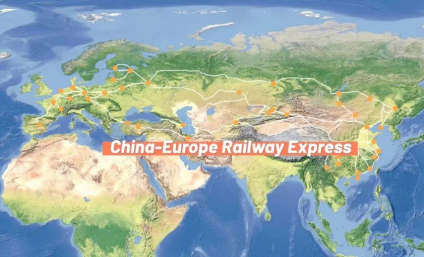
目前,中国境内已铺画中欧班列运行线86条,通达欧洲25个国家和地区超过200个城市,以及11个亚洲国家和地区超过100个城市。
古丝绸之路上的驼队如今已变成一条条钢铁驼队,从“连点成线”到“织线成网”,成为基本覆盖亚欧大陆全境的国际运输大动脉。
There are now 86 freight train lines in China that are linked to more than 200 cities in 25 European countries and regions and more than 100 cities in Asia, so the network covers almost the entire landmass of Eurasia.
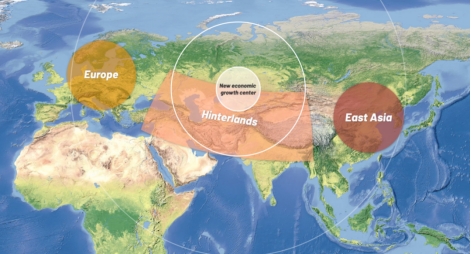
这张大网,将活跃的东亚经济圈、发达的欧洲经济圈和中间潜力巨大的广大腹地国家联系起来,沿途城市随着经贸往来日渐繁荣,一个世界经济的新增长中心正在孕育形成。
This network has brought together the economies of East Asia and developed Europe with the vast hinterland countries, resulting in increased economic and trade exchanges, the growth of thriving cities, and the emergence of a new center of global economic growth.
“基建”项目打破发展瓶颈
“一带一路”倡议改变世界的另一个方式,是通过一个个重点工程项目,提升各国的基础设施水平,打破制约发展中国家进步的瓶颈。
By tackling infrastructure disparities in developing countries, the initiative is helping dismantle obstacles that had long hampered their development.
在东南亚腹地的老挝,一条中老铁路(China-Laos Railway)让这个“陆锁国”变成“陆联国”。这条铁路连接老挝首都万象和中国云南,修建过程中,还清除了美国遗留下来的成千上万颗未爆炸的炸弹和地雷。铁路开通后客货两旺,口岸经济、跨境旅游蒸蒸日上。
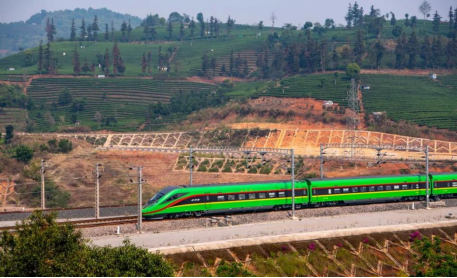
中老铁路图源:视觉中国
The China-Laos Railway brings to fruition a long-held dream of the Lao people to transform their country from a landlocked one to a land-linked hub.
在非洲,肯尼亚有了近百年来第一条现代化铁路,蒙内铁路(Mombasa-Nairobi Railway),解决了蒙巴萨港与内陆地区货物运输效率低下的问题。这条铁路不仅为当地创造了4.6万个工作岗位,拉动了经济增长超过2个百分点,更是让设有站点的30多个城镇重新焕发生机,新一轮城镇化浪潮正席卷铁路沿线。
The Mombasa-Nairobi Railway has created 46,000 jobs and added more than two percentage points to local economic growth. It has also revitalized more than 30 towns along the route, leading to a new wave of urbanization in the area.
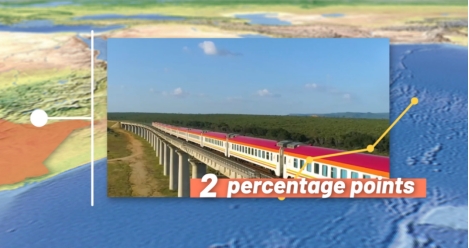
蒙内铁路
尼日利亚有了第一个现代化深水港,莱基港(Lekki Port)。它解决了老港设施陈旧,无法支撑海运需求的问题。据测算,莱基港45年内可以拉动尼日利亚3610亿美元的GDP增长,创造17万个就业岗位。一个港口带火了一座城,甚至一个国家。
Nigeria now has its first modern deep seaport Lekki, which is forecast to create nearly 170,000 jobs and generate revenue of $361 billion over the next 45 years.
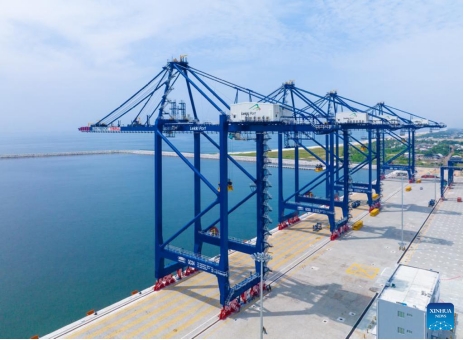
莱基港图源:新华社
马尔代夫有了印度洋上第一座跨海大桥,中马友谊大桥(China-Maldives Friendship Bridge)。海底复杂的珊瑚礁地质使得建设过程异常艰难,但中国企业硬是克服困难,把这座桥建了起来。
印尼有了第一条高铁,雅万高铁(Jakarta-Bandung High-speed Railway)。原本3.5小时的车程,如今只需40分钟,旅游业被带动起来。截至今年五月,已吸纳了当地5.1万人次就业。
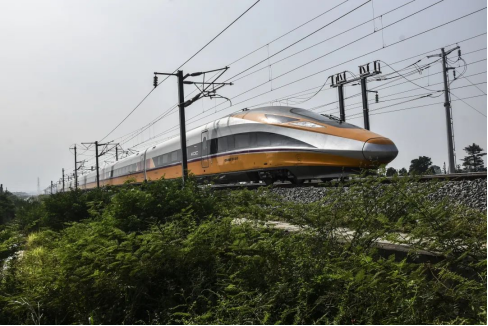
雅万高铁图源:东方IC
许多国家如牙买加、黑山共和国、乌干达有了第一条高速公路。
非洲大陆上还建起了水电站、风电场、光伏电站,因为“一带一路”倡议希望帮助非洲开发清洁能源,不要再重走西方工业化所经历的污染之路。
The initiative has facilitated the adoption of clean energy in Africa, helping it avoid the pollution associated with Western industrialization.
“一带一路”的大格局
“一带一路”倡议就是这样吸引了全球超过四分之三国家的参与,实实在在地改善了全球30%人口的生活。
10年里,倡议拉动近万亿美元投资规模,为共建国家创造42万个工作岗位,让将近4000万人摆脱贫困。许多发展中国家已经涌现了新兴产业;许多亚太国家实现了经济正增长,地区工业革命蓄势待发,数字经济发展迅猛。
The Belt and Road Initiative has attracted the participation of more than three-quarters of countries globally, substantially improving the lives of 30 percent of the world’s population.
The initiative has generated nearly a trillion dollars in investment in the past decade, created 420,000 local jobs and lifted nearly 40 million people out of poverty.
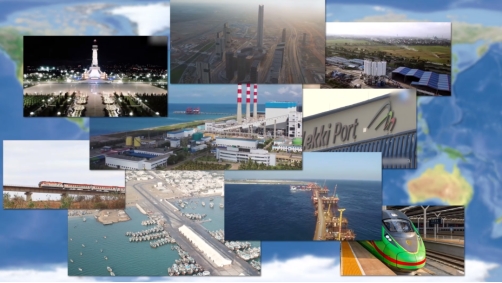
中国帮助发展中国家搞基建,这是西方国家数百年殖民这些土地时从未做过的事情,而中国做这些从不附加任何政治条件(with no strings attached),目的只是共同发展、合作共赢。
It should not be forgotten that China's role in developing infrastructure in less well-off countries is something their Western colonial masters never did. And contrary to what Western cynics say, that help comes with no strings attached. For China, everything these countries gain from its help is a gain for the world.
在长期被西方主导的世界秩序中,霸权主义、零和博弈、以强凌弱已是司空见惯。
“一带一路”倡议正是要打破不平等的丛林法则,开辟一条全球共同发展繁荣的新道路,让互联互通代替以邻为壑,让和平发展消弭争端分歧,让发展中国家牢牢掌握自己的命运,让世界结成休戚与共的人类命运共同体。
这就是“一带一路”倡议的宏大格局。它注定将成为人类社会发展史上一座重要里程碑。
转载自:中国日报